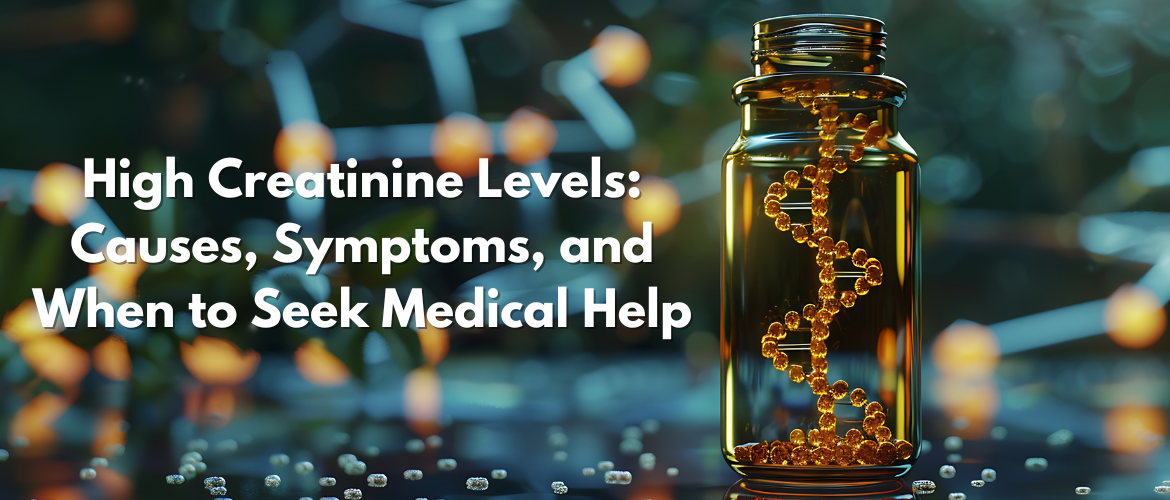No products in the cart.
High Creatinine Levels: Causes, Symptoms, and When to Seek Medical Help

Introduction: Understanding Creatinine and Kidney Health
The human body is a complex system, working tirelessly to filter waste, maintain balance, and regulate functions that keep us alive and healthy. One of the unsung heroes of this process is creatinine, a natural waste product generated by muscle metabolism. It is primarily filtered out of the blood by the kidneys, ensuring that excess creatinine does not accumulate and cause harm.
However, when creatinine levels rise above the normal range, it can be a sign that the kidneys are struggling. High creatinine levels may indicate an underlying issue—sometimes temporary, but other times a warning sign of chronic health problems.
In this comprehensive guide, we’ll dive deep into what creatinine is, why its levels may rise, the symptoms to watch for, and when you should seek medical attention. Understanding these factors can help you take proactive steps toward maintaining optimal kidney function and overall well-being.
1. What Is Creatinine and Why Does It Matter?
The Role of Creatinine in the Body
Creatinine is a byproduct of muscle metabolism, specifically from the breakdown of creatine—a compound that helps produce energy for muscles. Every time you move, exercise, or simply go about your daily activities, creatine is broken down into creatinine and released into the bloodstream.
The kidneys play a crucial role in filtering creatinine from the blood and eliminating it through urine. A stable balance is maintained when kidney function is normal, ensuring that creatinine levels remain within an acceptable range.
Normal Creatinine Levels
While levels can vary based on factors like age, sex, muscle mass, and activity levels, typical blood creatinine levels are:
- Men: 0.6 – 1.2 mg/dL
- Women: 0.5 – 1.1 mg/dL
- Children: 0.3 – 0.7 mg/dL
Any elevation beyond these values may signal kidney dysfunction or other health issues, warranting further investigation.
2. Causes of High Creatinine Levels
An increase in creatinine can stem from various factors, ranging from benign causes to serious medical conditions.
Temporary Causes (Non-Disease Related)
Not all cases of high creatinine indicate kidney disease. Some temporary conditions may cause short-term fluctuations, including:
- Dehydration – When the body lacks fluids, creatinine concentration in the blood rises because the kidneys struggle to filter waste efficiently.
- Intense Exercise – Strenuous workouts can break down muscle tissue, releasing excess creatinine into the bloodstream.
- High-Protein Diet – Eating excessive amounts of red meat or protein supplements can lead to increased creatinine production.
- Certain Medications – Nonsteroidal anti-inflammatory drugs (NSAIDs), antibiotics, and chemotherapy drugs can temporarily impair kidney function, raising creatinine levels.
Underlying Health Conditions Leading to High Creatinine
Beyond temporary spikes, persistently high creatinine often indicates kidney dysfunction or other medical issues, such as:
1. Chronic Kidney Disease (CKD)
One of the most serious causes of high creatinine, CKD occurs when the kidneys gradually lose their ability to filter waste effectively. This condition may progress over time and lead to kidney failure.
2. Acute Kidney Injury (AKI)
Sudden kidney failure, often due to infection, dehydration, blood loss, or toxic exposure, can cause a rapid spike in creatinine levels. Unlike CKD, AKI may be reversible if treated promptly.
3. Diabetes & High Blood Pressure
Both conditions place significant stress on the kidneys, potentially causing damage that leads to reduced kidney function and elevated creatinine levels.
4. Urinary Tract Obstruction
Kidney stones, tumors, or prostate enlargement can block urine flow, leading to creatinine buildup.
5. Autoimmune Disorders
Diseases like lupus and glomerulonephritis attack the kidneys, disrupting their ability to filter waste.
3. Symptoms of High Creatinine Levels
While high creatinine itself doesn’t cause symptoms, underlying conditions affecting kidney function can lead to noticeable signs.
Common Symptoms to Watch For
- Fatigue and Weakness – A result of toxins building up in the blood.
- Swelling (Edema) – Fluid retention, particularly in the legs, ankles, and face.
- Decreased Urine Output – Difficulty urinating or passing less urine than usual.
- Shortness of Breath – Excess fluid may accumulate in the lungs.
- Nausea and Vomiting – Toxin overload can disturb the digestive system.
- Confusion or Difficulty Concentrating – A sign of kidney-related toxin accumulation affecting brain function.
Advanced Symptoms in Severe Cases
- Severe itching due to toxin buildup.
- Muscle cramps from electrolyte imbalances.
- Chest pain if fluid builds around the heart.
If you experience any of these symptoms, seek medical advice immediately to prevent complications.
4. When to Seek Medical Help
Red Flags Indicating Urgent Kidney Issues
Consult a doctor if you notice:
- Persistent swelling and fluid retention
- Unexplained fatigue and weakness
- Blood in the urine or difficulty urinating
- Sudden changes in urine color or output
- Severe nausea, confusion, or breathing difficulties
Diagnostic Tests for Creatinine Levels
To determine whether high creatinine is a sign of kidney disease, your doctor may order:
- Blood creatinine test – Measures creatinine concentration.
- Glomerular Filtration Rate (GFR) – Evaluates kidney function.
- Urinalysis – Checks for protein, blood, and infection indicators.
- Imaging tests (Ultrasound/CT scan) – Detects kidney obstructions or structural issues.
Early detection and intervention can help manage kidney disease and prevent further complications.
5. How to Lower Creatinine Levels Naturally
If your creatinine levels are elevated due to temporary factors, lifestyle adjustments can help bring them back to normal.
Hydration Is Key
Drinking enough water ensures that the kidneys can efficiently flush creatinine from the body. Avoid sugary and high-caffeine beverages that may lead to dehydration.
Adopt a Kidney-Friendly Diet
- Reduce red meat and excess protein intake.
- Increase consumption of fruits, vegetables, and whole grains.
- Avoid processed foods high in sodium and artificial additives.
Exercise in Moderation
While exercise is beneficial, overtraining can increase creatinine levels due to excessive muscle breakdown. Balance intense workouts with proper recovery.
Monitor Medications
Certain drugs can strain the kidneys. Consult your doctor about alternatives or adjusting doses if necessary.
Conclusion: Prioritizing Kidney Health
High creatinine levels can be a temporary fluctuation or a serious health concern, depending on the underlying cause. While some factors like diet and dehydration can cause minor increases, persistent elevation may signal kidney disease or other medical conditions.
Key Takeaways:
✅ Creatinine is a waste product filtered by the kidneys, and high levels may indicate kidney dysfunction.
✅ Causes include dehydration, intense exercise, high-protein diets, diabetes, CKD, and urinary obstructions.
✅ Symptoms range from fatigue, swelling, and nausea to difficulty urinating and cognitive issues.
✅ Seek medical help if experiencing persistent or severe symptoms.
✅ Lifestyle changes like hydration, a balanced diet, and exercise moderation can support kidney health.
Monitoring creatinine levels through routine check-ups ensures early detection of kidney issues. Prioritize kidney health today for long-term well-being!
Start your wellness journey today — Visit Unike Nutra Now
Follow us
Facebook – https://www.facebook.com/profile.php?id=61567462823245
Instagram – https://www.instagram.com/unikenutra/
Twitter – https://x.com/Unikenutra
LinkedIn: https://www.linkedin.com/company/unike-nutra/
Amazon: https://www.amazon.com/stores/UnikeNutra/
Buy Now:






